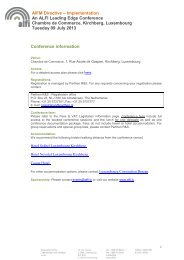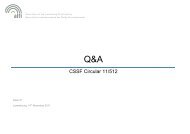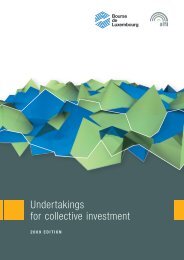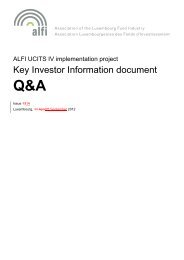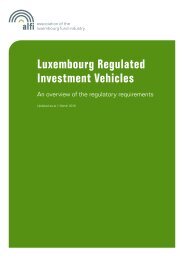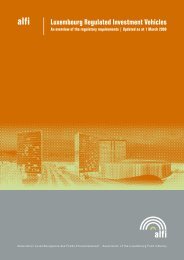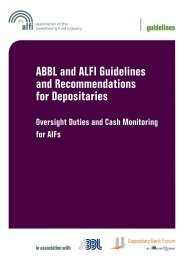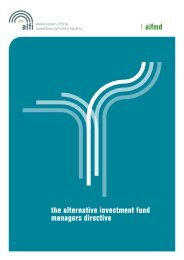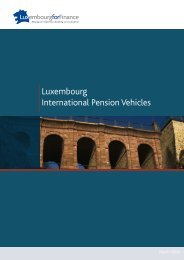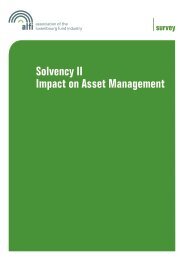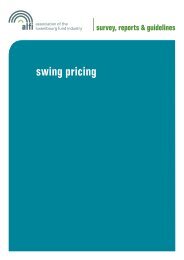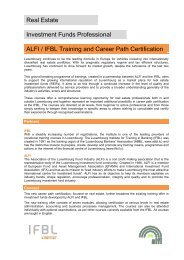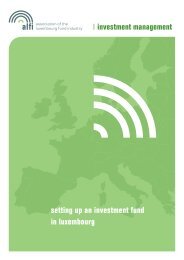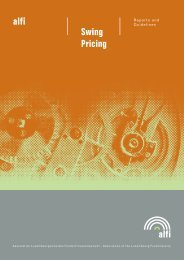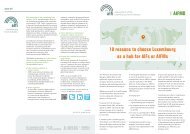Real Estate Investment Funds: Financial reporting - Alfi
Real Estate Investment Funds: Financial reporting - Alfi
Real Estate Investment Funds: Financial reporting - Alfi
You also want an ePaper? Increase the reach of your titles
YUMPU automatically turns print PDFs into web optimized ePapers that Google loves.
1. What specific issues<br />
arise with the use of<br />
the SICAR and the SIF<br />
for real estate<br />
investment?<br />
a. Under the SICAR and SIF legal frameworks,<br />
there is an exemption from the obligation to<br />
prepare consolidated accounts. This provision<br />
is generally targeted towards Private Equity<br />
and Hedge funds using the SICAR or SIF<br />
regulatory frameworks, rather than REIFs.<br />
b. According to the SIF law: Art 52. (5)<br />
"Notwithstanding article 309 of the Law of<br />
10 August 1915 on commercial companies, as<br />
amended, the Specialised <strong>Investment</strong> <strong>Funds</strong><br />
referred to in this law as well as their<br />
subsidiaries shall be exempt from the<br />
obligation to consolidate the companies held<br />
for investment purposes".<br />
According to the SICAR law: Art. 24 (3)<br />
"Notwithstanding article 309 of the Law of<br />
10 August 1915 on commercial companies, as<br />
amended, the SICAR shall be exempt from the<br />
obligation to prepare consolidated accounts."<br />
c. However, accounts prepared in accordance<br />
with IFRS would need to be consolidated in<br />
accordance with IAS 27.<br />
d. Practically, in order to show a true and fair<br />
view, most funds will opt to prepare<br />
consolidated accounts, as in most<br />
circumstances, non-consolidated accounts<br />
would not represent adequately the funds’<br />
activities to the investors (e.g. profits from<br />
rental activities, borrowing money at a<br />
subsidiary level). This would be especially true<br />
for funds which have a core or core plus<br />
strategy where income yields, funds from<br />
operations etc., are critical performance<br />
measures for investors. In addition, most<br />
lending banks usually require consolidated<br />
accounts, and if a public listing is<br />
contemplated, it is very likely that<br />
consolidated accounts will be necessary.<br />
The ALFI <strong>Real</strong> <strong>Estate</strong> <strong>Investment</strong>s <strong>Funds</strong><br />
Sub-Committee recommends REIFs to prepare<br />
consolidated accounts, which is followed in<br />
virtually all cases.<br />
e. If the exemption not to consolidate is<br />
applied, then the SICAR/SIF must make the<br />
best estimate of the fair value of the<br />
investments it holds. The non-consolidated<br />
accounts would still need to contain<br />
sufficient information to present a true and<br />
fair view of the activities of the fund.<br />
There is flexibility to derive the fair value of the<br />
SICAR/SIF investments on an overall basis by<br />
preparing consolidated accounts using fair<br />
value principles for the real estate assets at the<br />
level of the holding entity into which the<br />
SICAR/SIF directly invests, or by preparing<br />
such information for each "line" of investment<br />
in the structure and the holding structure.<br />
f. If the SICAR/SIF elects not to prepare<br />
consolidated accounts, then statutory<br />
consolidated accounts may need to be prepared<br />
and audited under the applicable corporate law<br />
for some holding entities in the overall fund<br />
structure (generally determined depending on<br />
the type of entity and certain size criteria such<br />
as turnover, net equity and staff).<br />
g. There is no requirement to make the Fund<br />
NAV public under Luxembourg law.<br />
2. What specific<br />
valuation issues arise<br />
with the use of the<br />
SICAR<br />
or SIF?<br />
a. Independent valuation and its frequency is not<br />
specified in the SICAR or SIF laws, but<br />
common and best practice is that in order to<br />
achieve a best estimate of fair value, an<br />
internal or external valuation of the properties<br />
should be prepared in accordance with a<br />
recognised property valuation standard, at<br />
least once a year to support the annual<br />
financial statements. For open-ended funds,<br />
common practice is to increase the frequency<br />
of external valuations to match the frequency<br />
of the dealing days, e.g. monthly or quarterly.<br />
b. In most cases, <strong>Funds</strong> will appoint independent<br />
valuers.<br />
Fund of <strong>Real</strong> <strong>Estate</strong> <strong>Funds</strong> (FOREF) questions<br />
(January 2010)<br />
Due to current market conditions, a number of<br />
key issues and questions have been raised as<br />
regard to <strong>Funds</strong> of <strong>Real</strong> <strong>Estate</strong> <strong>Funds</strong> ("FOREF")<br />
and particularly in the context of the calculation<br />
of Fund NAVs and the related production of<br />
financial statements. These are related to<br />
increased uncertainty with respect to the<br />
valuation of real estate and also the impact of<br />
current market conditions on other elements of<br />
the financial position of "investee" funds (also<br />
known as "target" or "underlying" funds) such<br />
as the "going concern" assumption and ongoing<br />
liquidity. This is crucial both in regard to Fund<br />
NAVs of "investee funds" which are reported<br />
for informational and statutory purposes, and<br />
for Fund NAVs that are used to price issues and<br />
redemptions, thus affecting the relative value of<br />
investors’ holdings in the "investee" fund.<br />
27



